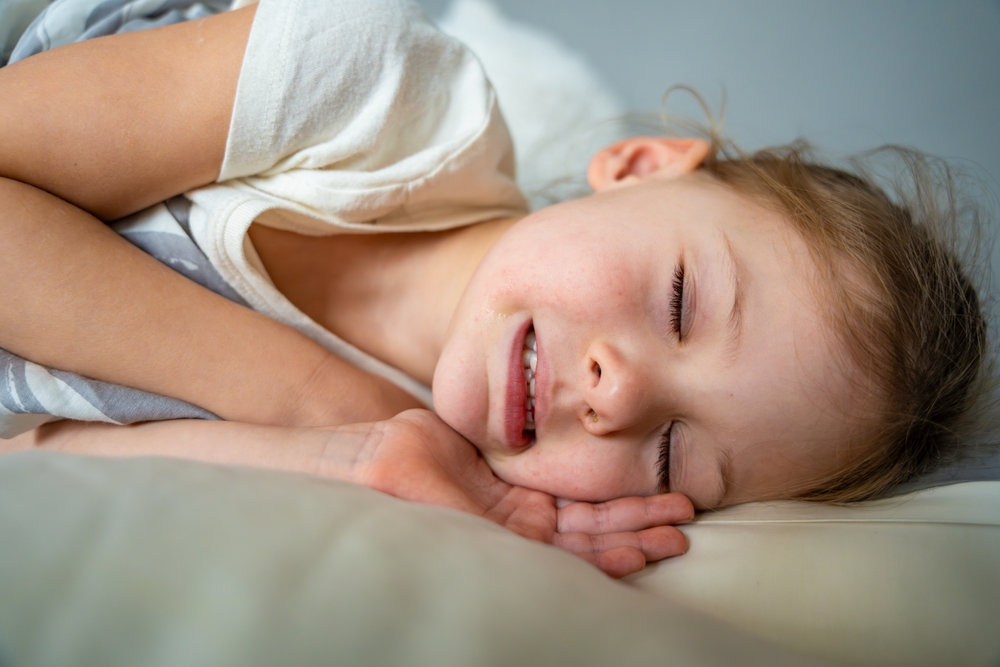
Problems Caused by Teeth Grinding in Children and How to Treat Them
Teeth Grinding in Children
Teeth grinding, also called bruxism, happens when a child clenches or grinds their teeth, usually at night during sleep. Many children do it without even knowing, and it’s more common than you might think. While some kids grow out of the habit, others continue grinding and may start to experience discomfort or damage.
If you’ve noticed your child making chewing or scraping sounds while sleeping, it’s worth paying attention. Teeth grinding can quietly create problems in their mouth, jaw, and daily comfort. Understanding what can happen is the first step to getting help early and avoiding more serious issues later.
Problems Caused by Teeth Grinding in Children
When a child grinds their teeth over time, it can lead to real physical problems—not just noises at night. The effects build up slowly but can become hard to ignore.
- Worn-down teeth
- Tooth sensitivity
- Jaw pain or tightness
- Headaches
- Cracked or chipped teeth
- Sleep disruption
Even one or two of these issues can affect how your child eats, sleeps, or focuses at school. Knowing what to look for helps you take action sooner.
1. Worn-down teeth
Worn-down teeth happen when the enamel, the hard surface layer of the tooth, gets flattened or thinned from repeated grinding. This can make your child’s teeth look shorter or uneven. Once enamel is gone, it doesn’t grow back, which leaves the teeth exposed and more prone to other problems.
When enamel wears down, teeth become weaker and less protected. Chewing food can become harder, and even brushing may cause discomfort. This kind of wear also increases the chance of needing dental treatment later, such as fillings or crowns.
2. Tooth sensitivity
Tooth sensitivity from grinding is caused by enamel loss or tiny cracks in the surface of the teeth. When this protective layer is worn away, hot or cold foods and even air can trigger sharp discomfort or pain.
Sensitive teeth can affect daily routines like eating or brushing. Your child might avoid certain foods or complain about pain without a clear cause. This makes it harder to maintain good oral hygiene and may lead to cavities or other issues.
3. Jaw pain or tightness
Grinding puts a lot of pressure on the muscles and joints around the jaw, especially during sleep. This tension can cause pain when your child talks, chews, or opens their mouth wide.
Over time, jaw tightness can lead to a cycle of discomfort and further clenching. If it goes on too long, the joint itself—the temporomandibular joint (TMJ)—may start to hurt or pop. This kind of chronic tension can affect how your child eats and speaks.
4. Headaches
Headaches caused by grinding often start near the temples and feel like a dull ache. These happen because of muscle strain in the face and jaw from constant clenching.
You might notice your child waking up tired or complaining of a sore head soon after getting up. These headaches can affect their focus at school or make them irritable. Addressing the grinding early can help prevent them from becoming frequent or more intense.
5. Cracked or chipped teeth
Constant grinding puts pressure on the tooth structure and can lead to small cracks or chips. These may not be visible at first but can weaken the teeth over time and increase the risk of decay.
Cracked or chipped teeth can also lead to pain, especially while eating. If left untreated, the damage can grow worse and may even require fillings or crowns. This type of damage often shows up first in molars, where the pressure from grinding is strongest.
6. Sleep disruption
Grinding during sleep can prevent deep, restful sleep—for your child and sometimes for you. The noise can keep siblings awake, and the tension in the jaw muscles can cause your child to wake up during the night.
Sleep disruption affects energy, behaviour, and mood. Children who grind their teeth may seem tired during the day, struggle with focus, or become easily frustrated. Improving sleep by treating bruxism can also improve daily life at home and school.
How Do You Know If Your Child is Grinding Their Teeth?
You might not see your child grinding their teeth, but there are signs that can help you catch the habit early. Teeth grinding often happens during sleep, so many kids aren’t aware they’re doing it. As a parent, paying attention to changes in behaviour, complaints about discomfort, or sounds at night can make a big difference.
One of the most common signs is a scraping or clicking sound when your child is asleep. This may be loud enough to hear from another room. You might also notice that your child wakes up complaining of jaw pain, headaches, or sore teeth—especially in the morning. These are strong indicators of bruxism.
Look closely at your child’s teeth. Flattened edges, signs of wear, or tiny chips may suggest grinding. If your child becomes sensitive to cold foods or brushing, that could also point to enamel loss from grinding. Some children clench their jaw during the day too, especially when stressed or concentrating.
If you’re unsure, a dentist can check for signs of wear or tension in the jaw. They may also ask about symptoms like sleep disruption or facial pain. Early detection helps avoid more serious problems and makes treatment easier.
How Do You Treat Teeth Grinding in Children?
Treatment for teeth grinding depends on the child’s age, the severity of the grinding, and whether it’s causing damage or discomfort.
In many cases, early-stage bruxism can be managed at home. For more persistent cases, especially when oral health is affected, a dentist may recommend a habit-breaking appliance.
At home, parents can help by reducing stress in the child’s daily routine, especially around bedtime. Stress is a common trigger for grinding, so calming activities like reading, warm baths, or quiet time before sleep can help. It’s also useful to monitor screen time and create a consistent sleep schedule. Encouraging your child to relax their jaw during the day and avoid chewing on objects like pencils or fingernails can reduce tension as well.
For children who continue grinding despite these efforts, habit-breaking appliances may be needed. These custom-fitted devices are placed in the mouth to stop the teeth from clenching together during sleep. They protect the teeth from wear and relieve pressure on the jaw muscles. Unlike mouthguards for sports, these appliances are designed specifically to interrupt the grinding habit.
Dentists typically recommend appliances for children six years and older, especially if enamel wear, chipped teeth, or jaw pain are present. While behavioural strategies are often tried first, appliances offer a reliable option when the grinding becomes more than a passing habit.
You can also read our guide on
Types of Habit Breaking Appliances and Their Cost
Kids Dental Group Can Help with Teeth Grinding
We understand how worrying it can be to see your child in pain or discomfort—especially when you’re not sure what’s causing it. If you think your child might be grinding their teeth, we’re here to help.
At Kids Dental Group, we work with families every day to diagnose and manage bruxism in children. Our team offers gentle, personalized care and can walk you through options that fit your child’s age and needs. We’re happy to offer a free consultation so you can get answers without pressure.
You can visit us in Richmond Hill, Markham, Stouffville, or Hillcrest. Reach out anytime—we’re ready when you are.
Contact us today
